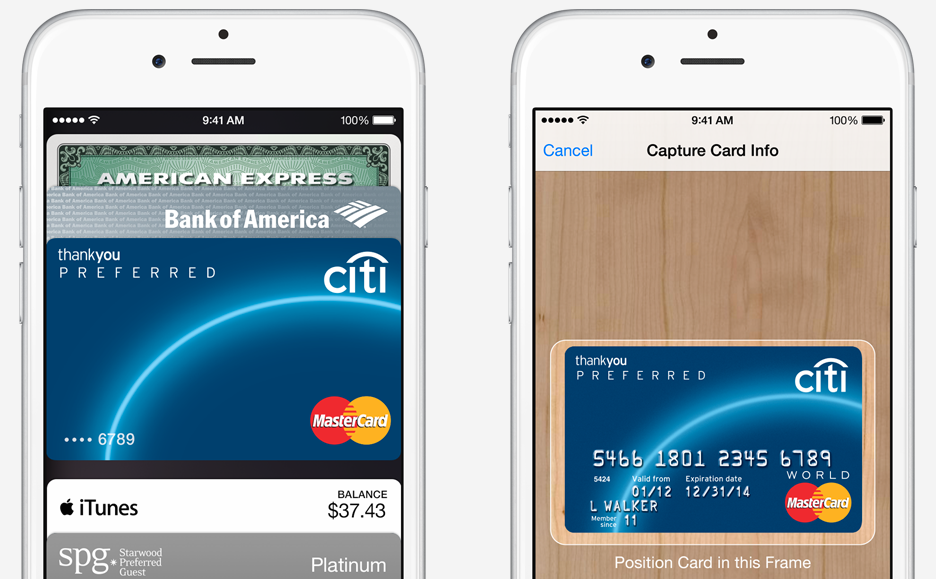Secure your place at the Digiday Media Buying Summit in Nashville, March 2-4

Apple just made Apple Pay, its new mobile payments system, available to consumers, but the company already has plans for using the service to bolster iAd, its mobile ad network: A new feature will integrate Apple Pay with Apple’s iAd mobile ad network in the form of a tap-to-buy button embedded in mobile ads, according to those familiar with the developments.
Advertising execs are praising the new feature as a boon to direct response and retail marketers, and as a way for Apple to differentiate the struggling mobile ad network. Apple declined a request for comment.
“It’s something I would definitely bring to clients,” Rachel Pasqua, mobile practice lead at media agency MEC, told Digiday. “We do so much mobile rich media for Paramount film releases that it would be fun to test this with.”
Pasqua added that the feature would also be intriguing for direct-response campaigns conducted by clients Ikea and Netflix.
Adding a buy button to ads is nothing new; Facebook and Twitter added buy buttons to their ads products in July and September of this year, respectively.
But Twitter and Facebook are using tap-to-buy ads to make money for themselves; buy buttons in iAd is intriguing in that they would allow the publishers that work with iAd to generate more mobile ad revenue from their apps.
Apple CEO Tim Cook said last month in an open letter to customers that Apple is foremost a device, not an advertising, company, and that its primary motivation for operating iAd is to help app publishers monetize. App publishers that use iAd retain 70 percent of the revenue generated, with 30 percent going to Apple. The stronger the crop of iOS apps, the easier it is to sell iPhones and iPads, the thinking goes.

Buy buttons in iAd would become even more compelling when combined with iAd’s new retargeting feature, which allows marketers to retarget users based upon their in-app activity. If a user is shopping for an item in a retailer’s app but ends up abandoning their shopping cart before purchasing, the retailer can now retarget that user with a mobile buy button ad for that item.
The new feature is expected to be in market by the end of the year, just in time for the holiday retail rush.
IAd has also been ramping up sales efforts on iAd’s add-to-Passbook feature, which allows iOS users to redeem coupons from mobile ads and send them directly to Passbook, Apple’s mobile wallet app. In this scenario, a toothpaste brand could send a coupon to iPhone users through iAd. When tapped, the coupon would be automatically added to Passbook, where it can be subsequently redeemed at the register.
“It would allow them to drive more coupon retention,” Pasqua said. “One of the stumbling blocks to couponing is friction and this would make it more seamless. I have all these good intentions to clip coupons but the process is so fragmented.”
Add-to-Passbook ads are intriguing to marketers because they “close the loop” attribution-wise, according to Jeff Malmad, managing director of mobile at media agency Mindshare. “It’s a nice way to track consumers through the customer journey,” he said.
These developments have sparked some much-needed excitement for iAd, where both the minimum buy-in price and its allure have gradually fallen since its inception: iAd’s minimum buy-in was $1 million when it launched in April 2010. That was halved less than a year later. The minimum was cut to $300,000 by July 2011, and again to $100,000 in February 2012.
“The mobile experience has transformed the shopping experience, and the ability to understand what consumers are doing on an aggregate level [with iAd] is very powerful for brands,” Malmad said.
Image via Apple
More in Marketing

WTF are tokens?
When someone sends a prompt or receives a response, the system breaks language into small segments. These fragments are tokens.

AI is changing how retailers select tech partners
The quick rise of artificial intelligence-powered tools has reshaped retailers’ process of selecting technology partners for anything from marketing to supply chain to merchandising.

YouTube’s upmarket TV push still runs on mid-funnel DNA
YouTube is balancing wanting to be premium TV, the short-form powerhouse and a creator economy engine all at once.





